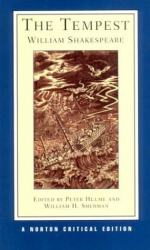|
This section contains 9,866 words (approx. 33 pages at 300 words per page) |

|
SOURCE: "'The Picture of Nobody': White Cannibalism in The Tempest," in The Production of English Renaissance Culture, edited by David Lee Miller, Sharon O'Dair and Harold Weber, Cornell University Press, 1994, pp. 262-92.
In the excerpt below, originally presented in 1990 at the Seventeenth Alabama Symposium in English and American Literature, Halpern examines cross-cultural elements in The Tempest and the way in which the Western myth of the Golden Age intersects with New World accounts of an American arcadia. Concluding a wide-ranging discussion of Gonzalo's commonwealth, colonialism, and modern as well as Renaissance political concepts, the critic asserts that the play expresses skepticism about Utopian attempts that deny the significance of cultural and racial fusion.
Tupi or not Tupi, that is the question.
—Oswald de Andrade, Manifesto Antropófago
In his 1971 essay "Caliban," the Cuban critic Roberto Fernández Retamar writes: "A European journalist, and moreover a leftist, asked me...
|
This section contains 9,866 words (approx. 33 pages at 300 words per page) |

|


